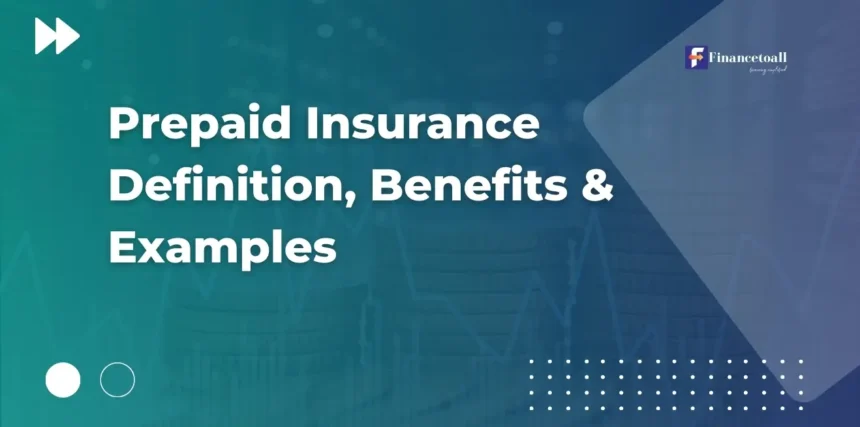Prepaid Insurance: A Simple Guide to Understanding It
Prepaid insurance refers to an insurance premium paid upfront for coverage that lasts over a future period. Initially, it’s recorded as an asset on the balance sheet and then gradually recognized as an expense each month, aligning with the period the coverage is used.
When you hear the term prepaid insurance, it might sound like a complicated financial concept. But in reality, it’s something that many businesses and individuals deal with on a regular basis. Whether you’re running a small business or managing your personal finances, understanding prepaid insurance is essential for making informed decisions about your finances.
In this article, we’ll break down what prepaid insurance is, how it works, its impact on your finances, and provide some real-world examples.
Key Takeaways
- Prepaid Insurance is an Asset: When you pay for insurance upfront, it is initially recorded as an asset on your balance sheet, as it represents coverage that will be used in the future.
- Amortization Spreads Out the Cost: As time passes and the insurance coverage is used, the prepaid insurance is gradually recognized as an expense on the income statement through the amortization process.
- Helps Manage Cash Flow: Paying for insurance in advance can help businesses manage large expenses and create a more predictable cash flow, although it might strain cash flow in the short term.
- Tax Benefits: Prepaid insurance allows businesses to spread the deduction of insurance premiums over the policy’s coverage period, which can help reduce taxable income over time.
- Risk of Overpayment and Complexity: While prepaid insurance provides financial flexibility, there’s a risk of overpaying if the policy is canceled early, and it can add complexity to financial reporting, especially for larger businesses.
What is Prepaid Insurance?
Prepaid insurance refers to the amount you pay upfront for an insurance policy that covers you for a future period. In other words, when you pay your insurance premium in advance, you’re essentially buying a service that will be used over a set period in the future.
For example, let’s say you pay $1,200 for a one-year health insurance policy. You have paid the entire amount at once, but the coverage lasts throughout the year. Since you’ve already paid the premium, the amount is recorded as a prepaid expense or prepaid insurance in your balance sheet. Over time, as each month passes, a portion of the prepaid insurance is moved from the asset side to the expense side of the financial statements.
How Does Prepaid Insurance Work in Accounting?
In accounting, prepaid insurance is considered an asset because it represents a future benefit. When you pay for insurance in advance, you’re essentially buying something that you will use in the future, and that makes it an asset until the benefit (the coverage) is consumed. Over time, this prepaid insurance is amortized, meaning it is gradually recognized as an expense.
Let’s break it down with a simple example. Imagine a company buys an insurance policy for $12,000 for one year. Here’s how the accounting would look:
- When the payment is made: The company pays $12,000 upfront for the insurance policy. The accounting entry would be:
- Debit: Prepaid Insurance (Asset) $12,000
- Credit: Cash (Asset) $12,000
- Each month, as the insurance is used: Every month, the company will recognize a portion of the prepaid insurance as an expense. Since the policy lasts for 12 months, the monthly expense will be $1,000 ($12,000 ÷ 12). The accounting entry for the first month would be:
- Debit: Insurance Expense (Expense) $1,000
- Credit: Prepaid Insurance (Asset) $1,000
How Does Prepaid Insurance Affect Financial Statements?
When you pay for insurance in advance, it’s classified as an asset on the balance sheet. As time passes, a portion of the prepaid insurance is amortized and recognized as an expense on the income statement, allowing businesses to match costs with the period they occur.
Why is Prepaid Insurance Important in Finance?
1. Impact on Cash Flow
Paying for insurance in advance might seem like a significant expense upfront, but it can actually help manage your cash flow. Businesses can plan for large expenses and avoid the unexpected strain of paying a big bill in the middle of the year.
For Example: a small business that knows it needs to pay for insurance every year might budget for the payment in advance. By paying the premium upfront, they avoid having to manage monthly insurance payments, which could interfere with cash flow during busy periods.
2. Asset and Expense Management
By treating prepaid insurance as an asset at first, businesses can better track their asset management and ensure they are accurately reporting expenses over time. Instead of recognizing the entire premium as an expense at once (which would overstate expenses in one period), businesses spread out the expense. This aligns with the matching principle in accounting, which states that expenses should be matched with the revenues they help generate.
This is especially important for businesses that need to show an accurate financial picture to investors, lenders, or tax authorities.
3. Tax Benefits
Another advantage of prepaid insurance is that it can help businesses manage their taxable income. Since prepaid insurance is typically amortized over the policy’s coverage period, businesses can deduct insurance premiums from their taxable income gradually, rather than all at once.
For example, if a company prepaids $12,000 for insurance, they can deduct $1,000 each month as an insurance expense. This can reduce their overall taxable income for the year.
Key Accounting Terms Related to Prepaid Insurance
Here’s a list of important accounting terms you’ll come across when dealing with prepaid insurance:
- Prepaid Expense: A payment made for services to be received in the future, like insurance. Prepaid insurance is a type of prepaid expense.
- Amortization: The process of gradually recognizing the cost of an intangible asset (like prepaid insurance) as an expense over time.
- Accrual Accounting: A method of accounting that records revenue and expenses when they occur, not when cash changes hands.
- Asset: Anything of value that a business owns, including prepaid insurance, which is an asset until the benefit is used.
- Insurance Premium: The amount of money paid for an insurance policy.
- Expense: Money spent on costs necessary to run the business, such as insurance expenses.
- Balance Sheet: A financial statement showing a company’s financial position, listing assets, liabilities, and equity.
Real-World Example of Prepaid Insurance Accounting:
Let’s say XYZ Corporation pays $24,000 for a two-year property insurance policy on January 1st. Here’s how they would handle the prepaid insurance:
- Initial payment (January 1st): Debit: Prepaid Insurance (Asset) $24,000 Credit: Cash (Asset) $24,000
- End of January (one month has passed): Debit: Insurance Expense (Expense) $1,000 Credit: Prepaid Insurance (Asset) $1,000
- End of February (two months have passed): Debit: Insurance Expense (Expense) $1,000 Credit: Prepaid Insurance (Asset) $1,000
The company will continue making this entry each month until the prepaid insurance is fully amortized over the two-year period.
Challenges and Risks of Prepaid Insurance
1. Risk of Overpayment
One of the risks of prepaid insurance is that businesses or individuals may overpay for coverage they don’t need. If a company cancels the policy or if circumstances change, they may lose some of the prepayment.
For example, if a business decides to switch insurance providers mid-year, they may not receive a full refund for the unused coverage.
2. Impact on Cash Flow
While prepaid insurance can help manage cash flow in the long term, it can create a short-term cash flow strain. For small businesses, paying large premiums upfront can be a significant burden, especially if they’re already dealing with other financial challenges.
3. Complexity in Financial Reporting
Properly managing and reporting prepaid insurance can be complex, especially for larger companies with multiple policies or for individuals managing various types of insurance. Keeping track of when to expense each portion of the prepaid premium can become a tricky task without proper accounting systems in place.
Key Benefits of Prepaid Insurance
Prepaid insurance helps manage cash flow, allows for better budgeting, and offers potential tax benefits by spreading deductions over time. However, it’s important to be aware of the risks of overpayment or refund issues if the policy is canceled early.
Prepaid Insurance and Personal Finance
While prepaid insurance is often discussed in the context of business finance, it’s also relevant to personal finance. Individuals who prepay for life insurance, health insurance, or auto insurance are also dealing with prepaid expenses.
For example, if you prepay $1,200 for a one-year car insurance policy, that amount will be recorded as prepaid insurance in your personal finances. Each month, a portion of the prepaid insurance will be recognized as an expense. This is similar to how businesses handle prepaid insurance, though on a smaller scale.
Why Should You Care About Prepaid Insurance?
Understanding prepaid insurance is crucial for both businesses and individuals. It affects your financial planning, your ability to manage cash flow, and how you report expenses. By grasping the concept of prepaid insurance, you can make better decisions about your insurance policies, understand how they impact your balance sheets, and even potentially save money through smarter financial planning.
Prepaid Insurance vs. Insurance Expense
Prepaid insurance is an upfront payment for future coverage, recorded as an asset. Insurance expense reflects the portion of that prepaid amount used over time. It’s important to distinguish between the two for accurate financial reporting.
Conclusion
Prepaid insurance is an essential concept in both personal and business finance. It helps spread the cost of insurance over time, improves cash flow management, and ensures that businesses and individuals can manage large premiums more effectively. By understanding how prepaid insurance works, how it’s reported on financial statements, and the benefits it offers, you can make smarter financial decisions.
Frequently Asked Questions (FAQ) about Prepaid Insurance
1. What is prepaid insurance?
Prepaid insurance refers to an insurance premium that is paid in advance for coverage that will be provided over a future period. It is considered an asset on the balance sheet until the coverage is used, after which it is gradually recognized as an expense.
2. How is prepaid insurance accounted for in financial statements?
Initially, prepaid insurance is recorded as an asset on the balance sheet. Over time, as the insurance coverage is used, it is amortized and recognized as an expense on the income statement. This process helps to match the expense with the period during which the insurance coverage applies.
3. Why is prepaid insurance treated as an asset?
Prepaid insurance is considered an asset because it represents a future benefit—the insurance coverage will be used over time. Since it is paid upfront but provides coverage in future periods, it is classified as an asset until the benefit is realized.
4. Can prepaid insurance be refunded?
In some cases, if an insurance policy is canceled early, you may be eligible for a refund of the unused premium. However, the refund amount depends on the terms and conditions of the insurance provider, and not all policies offer prorated refunds.
5. How does prepaid insurance affect cash flow?
Prepaid insurance can have an impact on cash flow because it requires a large upfront payment. While it can help smooth out monthly payments and create predictable financial planning, the initial outlay can strain cash flow, especially for small businesses or individuals who might not have a large cash reserve.
6. Is prepaid insurance the same as regular insurance expense?
No, prepaid insurance is different from a regular insurance expense. Prepaid insurance is an upfront payment made for future coverage, and it’s classified as an asset. Insurance expense, on the other hand, represents the portion of the prepaid insurance that has been used up during the period, and it is recorded on the income statement as an expense.
7. Can prepaid insurance be used as a tax deduction?
Yes, prepaid insurance can offer tax benefits. Businesses can amortize the insurance premium over the policy period, allowing them to deduct the expense gradually rather than all at once. This can help reduce taxable income each year.









